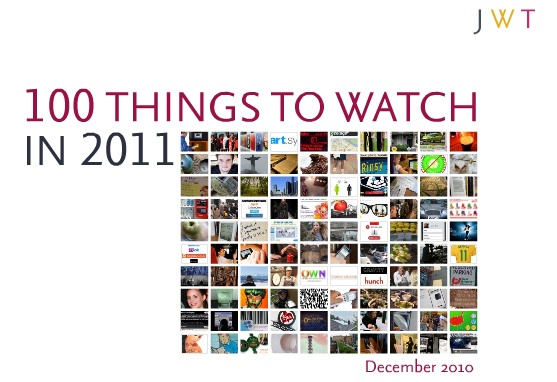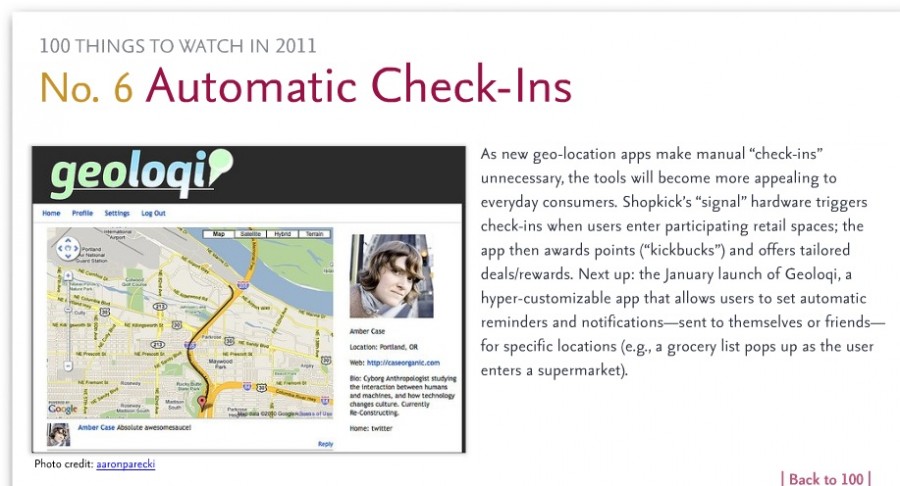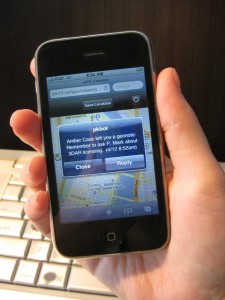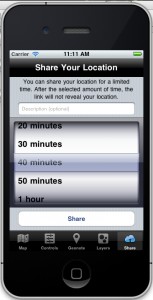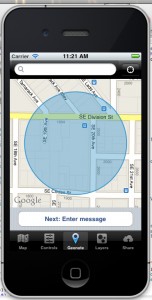 Today’s guest post is by Thomas Wendt, a Social Engagement Specialist in Minneapolis. Thomas is interested digital technology and its effect on the human condition, and explores theories of the technological “beyond,” imagining what humanity will look like when machines are as intelligent (or more so) than us.
Today’s guest post is by Thomas Wendt, a Social Engagement Specialist in Minneapolis. Thomas is interested digital technology and its effect on the human condition, and explores theories of the technological “beyond,” imagining what humanity will look like when machines are as intelligent (or more so) than us.
I’ve been geeking a little bit lately about Geoloqi, a location-based application that enables users to send location information to others and leave geonotes based on GPS coordinates. Developed by Amber Case, UX Designer and Cyborg Anthropoligist, you can definitely see the efforts made to make the app user-friendly and simple. I see lots of potential here.
As much as we live in digital spaces and rely on our digital identities, the fact remains that physical space is still a huge part of everyday life. This might change some day, but for now we are based in physical reality and in some ways constrained by it. Geoloqi taps into a desire to assert some kind of control over the physical, or at least to know more about it.
Enter Geoloqi. I see this app as essentially a convenience tool that revolves around utility. Sure, the technology is striking, the idea behind it is impressive, and the interface is pretty, but at heart the application plays to our sense of practicality and ease. I recently co-presented on social innovation at the agency I work for, and we all agreed that location applications are experiencing some early adopter burnout. I think users are looking for this utility that Geoloqi offers, which made it our primary example of practical location services.
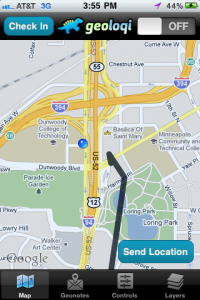
This is my route from work to home. I sent my location as an SMS message to my boss saying that I will be back online when I get home. Through a temorary link, he was able to follow my location in real time.
Okay, I did this for the geek factor. But think about when you’re on your way to for a time-sensitive meeting and get caught in unexpected traffic. Send your location via SMS, email, Twitter, etc. to the person you are meeting and they will have a real time sense of your arrival.
And how about delivery services? Bike messengers, courriers, and even pizza delivery people can use this app to allow customers to track progress for time-sensitive deliveries (and what could be more time-sensitive than pizza?).
Have you ever been out with a friends who has had one too many nips off the bottle and needs to get home by walking through that sketchy neighborhood? Have them send their location (or do it for them if you’re more coordinated at that point) and make sure they get back safely.
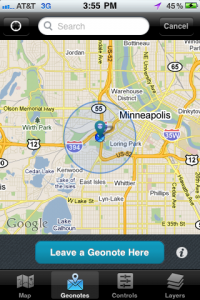
Geonotes are the other great feature. A geonote is pretty much exactly what it sounds like: a virtual note left based on geographical coordinates. Select the location of your office and leave a geonote containing a quick morning to-do list. When you arrive, you’ll receive a push notification with that note.
The big example that Geoloqi likes to use is a shopping list. It works the same way: tag your grocery store with a list and have it delivered upon arrival.
Used in conjunction augmented reality, I think this technology can add tons of value to urban street games. Geonotes could function as clues while location tracking can add new variables to competition and timing.
Some new features coming soon include better integration into Twitter feeds and automatic check-in options. I would also like to see some more battery-saving options. This is the big drawback with these types of apps; either a user sacrifices battery life or they have to constantly turn GPS tracking on and off. It prevents one from using the app for extended periods of time or without constant manual updates. Nonetheless, this is not a fault of this app in particular but rather GPS in general.
Send me a geonote here.
Check out Amber Case’s TED talk.
You can read the original post on Thomas’ blog, Surrounding Signifiers.


 Today’s guest post is by
Today’s guest post is by 

